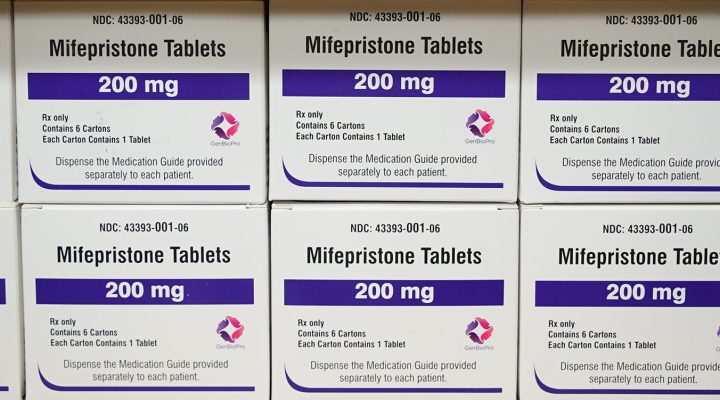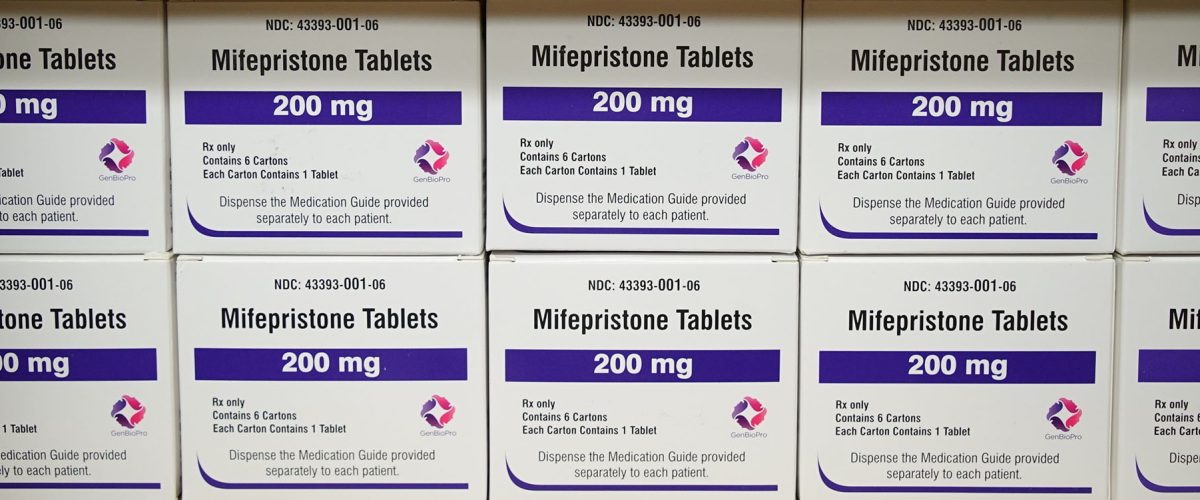The abortion-inducing drug mifepristone will remain on the market after the U.S. Supreme Court unanimously rejected a lawsuit challenging the Food and Drug Administration’s approval of the medication.
The June 13 decision in FDA v. Alliance for Hippocratic Medicine also means the pill will be available through the mail at a time when 14 states have made abortion illegal and at least 11 more are seeking to implement full prohibitions.
As the lead medical organization in the case, the alliance sought both an end to two decades of mifepristone approval and to its availability through the mail since the COVID-19 pandemic. A favorable ruling by a Trump-appointed federal judge in West Texas was partially overturned in August by the Fifth Circuit U.S. Court of Appeals, which left the drug’s approval intact but reversed rules easing its availability.

Matthew J. Kacsmaryk (JUDICIARY.SENATE.GOV)
The high court steered clear of those questions in rejecting the case, focusing instead on the fact the physicians lacked legal standing to bring a lawsuit in the first place.
Those who brought the case were accused by critics of “judge shopping,” a practice where plaintiffs seek to find the most sympathetic court in the federal system to file their case. The Amarillo-based courtroom of Judge Matthew Kacsmaryk offered both a known anti-abortion sympathizer and a court with only one president judge, meaning there was no chance of drawing a less-favorable judge in the same court.
Appealing to a conservative judge may have worked at first, but it did not pass muster with the Supreme Court’s conservative majority.
“Citizens and doctors do not have standing to sue simply because others are allowed to engage in certain activities.”
“We recognize that many citizens, including the plaintiff doctors here, have sincere concerns about and objections to others using mifepristone and obtaining abortions,” Justice Brett Kavanaugh wrote for the unanimous court. “But citizens and doctors do not have standing to sue simply because others are allowed to engage in certain activities — at least without the plaintiffs demonstrating how they would be injured by the government’s alleged under-regulation of others.”
The alliance claims its injuries included the possibility some of its members could be forced to treat women sickened by mifepristone, and that they may have to violate their religious beliefs by performing emergency abortions in cases of drug failure.

Brett Kavanaugh
Kavanaugh dismissed the doctors’ claims to such “downstream conscience injuries” and pointed out that federal law already protects them from being required to perform abortions.
The physicians group also claimed it suffered financial harm from FDA policies that “caused” them to spend money on their own mifepristone studies and to devote considerable time drafting petitions and engaging in public advocacy against the medication.
“But an organization that has not suffered a concrete injury caused by a defendant’s action cannot spend its way into standing simply by expending money to gather information and advocate against the defendant’s action. An organization cannot manufacture its own standing in that way,” Kavanaugh countered.
The federal courts are the wrong place to pursue such action because the Constitution does not recognize moral and ideological objections as sufficient to grant standing, he added.
“The plaintiffs may present their concerns and objections to the president and FDA in the regulatory process, or to Congress and the president in the legislative process. And they may also express their views about abortion and mifepristone to fellow citizens, including in the political and electoral processes.”
President Joe Biden was cool to news of the decision despite the fact it enables women to continue receiving medication abortion through the mail — something he favors.
“Today’s decision does not change the fact that the fight for reproductive freedom continues.”
“Today’s decision does not change the fact that the fight for reproductive freedom continues,” he said. “It does not change the fact that the Supreme Court overturned Roe v. Wade two years ago, and women lost a fundamental freedom. It does not change the fact that the right for a woman to get the treatment she needs is imperiled if not impossible in many states.”
The effort to ban mifepristone is part of the same scheme that has led to abortion bans that in many cases prevent women from accessing the procedure in the case of incest or rape, Biden added. “Doctors and nurses are being threatened with jail time, including life in prison, for providing the health care they have been trained to provide. And contraception and IVF are under attack.”
For now, Americans United for Separation of Church and State celebrated the decision as a win against Christian nationalism.
“Today, religious extremists suffered a setback in their quest to force all of us to live by their narrow beliefs,” AU President Rachel Laser said. “The Supreme Court’s decision to deny standing to anti-abortion activists and leave in place the FDA’s approval of mifepristone is not only a welcome victory for abortion access, but also for the separation of church and state.”
Laser cited FDA v. Alliance for Hippocratic Medicine as “a textbook example” of Christian nationalist efforts to strip Americans of their rights: “Even as we celebrate the Supreme Court’s decision today, we know reproductive rights remain at risk across the country, thanks in large part to the ultra-conservative justices who overturned Roe v. Wade.”
The American Medical Association, one 16 U.S. medical societies to file an amicus brief against the case in March, has long touted mifepristone’s two-decade safety record and has supported efforts to make it easily accessible.

Brent Leatherwood
“Reimposing unnecessary limits on mifepristone, which is used in the two-drug protocol for medication abortion and miscarriage management, will jeopardize public health and significantly worsen inequities in maternal health for people of color, those with low incomes and those living in underserved communities,” AMA said.
Conservative groups, including the Southern Baptist Ethics and Religious Liberty Commission, lamented the lost opportunity to advance their agenda.
“The court is sending a clear signal it would prefer this question be settled elsewhere. Unfortunately, by not ruling on the merits and allowing this drug to remain available on procedural grounds, the court is affording more time for the abortion industry to target vulnerable mothers with these harmful chemicals,” said ERLC President Brent Leatherwood. “Preborn lives will inevitably be lost as a result. That is what makes today’s loss so heartbreaking.”
This is one of two major abortion cases to be ruled on by the Supreme Court before mid-summer.
Related articles:
Your guide to the Supreme Court’s upcoming blockbuster decisions
Here’s what you need to know to understand that SBC resolution opposing IVF | Analysis by Mark Wingfield


